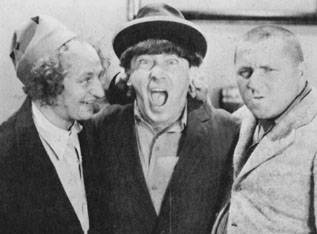Afterwards, Fed Chairmain Greenspan and Commerce Secretary Evans explained the 'Strong' dollar policy to Treasury Secretary Snow.

Richard W.
Bullcarp
Afterwards, Fed Chairmain Greenspan and Commerce Secretary Evans explained the 'Strong' dollar policy to Treasury Secretary Snow.

China and Japan reject Bush's currency pleas By Peronet Despeignes, USA TODAY BANGKOK - President Bush failed in weekend jawboning sessions to persuade either China or Japan to quickly allow the value of their currencies to rise against the dollar, which would give U.S. manufacturers a boost as they try to sell their goods into Asian markets.
Leaders of both countries responded to the president's entreaties with a polite, implicit "no," insisting they had their own problems and that the regime of freely floating exchange rates the White House has pushed for months could undermine economic stability across Asia and the world. Bush told Japanese Prime Minister Junichiro Koizumi in Tokyo on Saturday that markets should be allowed to determine exchange rates, and the president had said he planned to take the same message to Chinese President Hu Jintao at a face-to-face meeting here in Bangkok on Sunday.
As the U.S. job market continues to languish on the eve of an election year, the White House is under mounting political pressure to relieve competitive pressures on embattled U.S. factories, where the majority of U.S. job losses have occurred. U.S. employment has shrunk for 26 of the last 33 months - a stretch unmatched since the Great Depression - and by more than 2 million over the past three years. Economic growth is picking up sharply, but economists aren't sure how sustainable it is or when investment and hiring will follow.
U.S. manufacturers have complained bitterly that foreign efforts to keep the value of the Chinese yuan and the Japanese yen artificially low against the dollar have badly hurt U.S. exports. Cheap foreign currencies mean Chinese and Japanese exports sell for less in U.S. markets, while the strong dollar makes U.S. exports more expensive overseas.
Gentle rebuff
Though they didn't say "no" in so many words, public comments from Koizumi and Hu amounted to a gentle but firm rebuff of the president's pleas for relief. Koizumi insisted Japan "will take measures in dealing with wild fluctuations" in currency values. He warned rapid currency shifts could "upset the market," apparently defending Japan's frequent currency market interventions to suppress the yen's rise against the dollar.
Japan has managed to keep the yen between roughly 100 and 130 to the dollar for the last few years. Lower values mean a stronger yen: Some believe that if the Japanese government stopped intervening in currency markets, the yen could strengthen to the point where it would take 90 or fewer yen to buy a dollar.
On Sunday, Hu said China would keep its promises to continue economic reforms and further open its booming market to foreigners. He said China was ready "to resolve whatever questions that might emerge in our economic exchanges and trade through dialogue," and he agreed to a joint U.S.-China study of allowing the yuan to strengthen. But he added that the current exchange rate of China's yuan to the dollar was "consistent" with the current state of China's economy and its financial system. China restricts currency trading to keep the yuan pegged at about 8.3 to the dollar.
"Keeping the exchange rate of the (yuan) stable serves China's economic performance and conforms to the requirement of the economic development of the Asia-pacific region and the whole world," Hu said in a speech Sunday to CEOs gathered for the 21-nation Asia-Pacific Economic Cooperation summit that begins here Monday. Neither Hu nor Bush directly mentioned exchange rates after their meetings, but Bush said they discussed the "need to make sure that trade is open and that both countries benefit."
Fearful of losing support at home, Beijing sees a steady currency as both a safety valve and a firebreak that keeps its rickety financial system and the shakier parts of its economy from imploding.
The nation is still in the midst of a difficult and uncertain transition to more of a free-market economy. Its government-owned companies have shed more than 17 million jobs over the past six years.
That's roughly proportional, measured against its much larger population, to the more than 2 million jobs the U.S. labor market has lost over the past three years.
Anger at China
Hu, in a picture-taking session with Bush after their talks in Bangkok, said both presidents had agreed "that the economic cooperation and trade between our two countries have benefited our two peoples tremendously."
But some U.S. lawmakers, disturbed by China's fast-growing trade surplus, which they say is costing American jobs, have threatened to repeal Beijing's trade privileges in the United States. Several bills have been proposed in Congress, with some Republican support, to impose retaliatory tariffs if China doesn't allow the yuan to float freely.
Economist David Hale of Hale Advisors, based in Chicago, told Asian officials and businessmen here, who are highly reliant on exports to the USA, that "the situation in the U.S. is extremely dangerous" now, with congressional Democrats and Republicans alike attacking China.
"The president is under great pressure now because of the jobless recovery ... (and) support for free trade (in) the Republican Party has collapsed," Hale said. "Much will depend on what happens to U.S. employment over the coming months. If we keep losing jobs, my great fear is that early next year, Karl Rove, the president's political strategist, will say, 'Mr. President, it's time for you to join the China bashers.' "
Hale said that could trigger a financial crisis that would hurt the USA because Asian countries have amassed huge reserves of dollars and dollar-based assets to keep their exchange rates low. A reversal, he said, could push up U.S. interest rates and undermine consumer spending and the housing market.